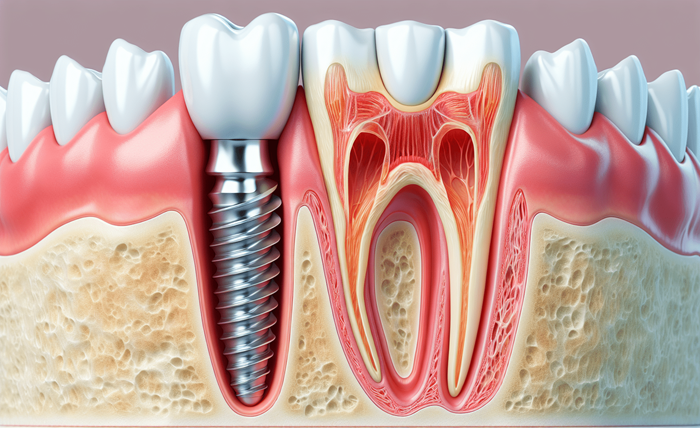In today’s world, a confident smile is key to creating connections and making dental health essential. Dental implants provide a strong solution for restoring smiles and improving oral health. This guide offers insights for health-conscious individuals and adults seeking to enhance their dental well-being.
The Dental Implant Procedure Unveiled
Pre-surgery Consultation and Planning
The first step is a comprehensive consultation with your dentist. During this visit, your dentist will evaluate your oral health, discuss your goals, and determine if dental implants are the right choice for you. This stage often includes detailed imaging like X-rays or CT scans to assess your bone structure and plan the implant’s placement accurately.
A personalized treatment plan is crafted based on your individual needs and circumstances. This blueprint will guide the entire process, ensuring that each step is tailored to achieve the best results for you. The planning phase is crucial as it lays the groundwork for a successful procedure, minimizing risks and enhancing outcomes.
The Implant Surgery Process
The surgical procedure involves placing the implant, which is typically made of titanium, into the jawbone. This serves as the artificial root for your new tooth. The surgery is usually performed under local anesthesia, ensuring a comfortable experience with minimal discomfort.
During surgery, a small incision is made in the gum to expose the bone. A hole is drilled to place the implant securely. After insertion, the gum is stitched back, and your healing process begins. In some cases, a temporary crown may be placed for aesthetic purposes until the implant integrates with the bone.
Post-surgery Recovery and Care
Recovery is a vital aspect of the dental implant process. Initially, you may experience swelling and discomfort, which can be managed with prescribed medications. Good oral hygiene practices, such as gentle brushing and rinsing, are paramount during this period to prevent infection.
Follow-up appointments will monitor the healing process, ensuring the implant integrates well with the bone—a process known as osseointegration. Once fully healed, an abutment is attached, and finally, a custom-made crown is placed, completing your new smile.
Benefits That Go Beyond Aesthetics
Improved Oral Health and Aesthetics
Dental implants provide a natural look and feel, seamlessly blending with your existing teeth. They help maintain the natural shape of your face and smile, thus boosting your confidence. Unlike dentures, implants don’t slip or make noise, offering a stable and comfortable solution.
Furthermore, implants support your overall oral health by preserving the jawbone and preventing bone loss. They don’t require altering adjacent teeth, which preserves more of your natural dentition. This helps maintain a healthy mouth structure and promotes better long-term oral health, especially when combined with cosmetic dentistry options like those available in Kennewick, WA.
Long-term Cost-effectiveness
While the upfront cost of dental implants may seem higher than other solutions, they prove to be cost-effective over time. Implants are durable and designed to last many years, often a lifetime, with proper care. This longevity eliminates the need for frequent replacements, which can add up with alternatives like bridges and dentures.
Additionally, the reduced need for maintenance visits and adjustments further contributes to their economic advantage. Investing in dental implants now can save you from recurring expenses, making them a smart choice for the future.
Navigating Potential Complications
Common Risks and Their Mitigation
Possible complications include infection at the implant site, injury to surrounding teeth or nerves, and implant failure due to poor integration. However, these risks are relatively rare and can often be minimized with proper planning and care.
Choosing a qualified and experienced dental professional is essential. They will use precision techniques and follow stringent protocols to reduce potential issues. Post-operative care, including following your dentist’s instructions meticulously, plays a significant role in preventing complications.
Ensuring a Smooth Process
Maintaining good oral hygiene is crucial both before and after the procedure. Regular dental check-ups ensure any issues are identified and addressed promptly. Adhering to recommended dietary modifications, especially during the healing phase, also supports a successful outcome.
Are You a Candidate? Preparing for Dental Implants
Factors Influencing Implant Suitability
Good candidates typically have healthy gums and sufficient bone density to support the implant. If bone loss is a concern, procedures such as bone grafting might be recommended to prepare the jaw for implants.
Chronic illnesses like diabetes or heart disease require careful management, as they can affect healing. Smoking can also impede recovery, so cessation is advised before undergoing the procedure.
Steps for Personal Preparation
Preparation goes beyond physical aspects. Mentally preparing for the process, understanding the timeline, and setting realistic expectations are equally important. Discuss any concerns with your dentist and ensure all your questions are answered before proceeding.
Following pre-surgery guidelines, such as avoiding certain medications or fasting, will help ensure a smooth surgery. Emotional readiness, equipped with knowledge and support, enhances your readiness for a successful implant experience.
Your Questions Answered
Tackling Concerns and Myths
Many worry about the pain involved; however, advancements in anesthesia and pain management have made the process relatively comfortable. Recovery discomfort is typically mild and manageable with prescribed medications.
Another misconception is that implants require frequent replacements. In reality, with proper care, they are a long-lasting solution. The fear of rejection is also largely unfounded, as titanium implants have a high success rate due to their biocompatibility.
Conclusion
Now that you have a better understanding of dental implants, their benefits, and potential complications, you can confidently consider them as a restorative option. Remember to choose an experienced dental professional and follow pre- and post-operative care instructions for a successful implant journey. With proper care, your new smile can last a lifetime.



